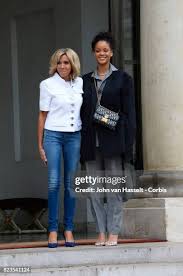Understanding Brigitte Macron’s Influence on French Society

Introduction
Brigitte Macron, the wife of French President Emmanuel Macron, has emerged as a prominent figure in French politics and society since her husband assumed office in 2017. As the first lady of France, her role extends beyond traditional ceremonial duties, engaging in numerous social initiatives and advocacy campaigns. This article examines her background, contributions, and significance in contemporary French culture and politics.
Background and Early Life
Born in Amiens in 1953, Brigitte Trogneux was a high school teacher before becoming involved in politics. She met Emmanuel Macron when he was only 15 years old, and their unique relationship faced considerable scrutiny due to their age difference—Brigitte is 25 years older than Emmanuel. Their marriage in 2007, after his parents initially objected to their relationship, became a topic of public interest. However, it is her commitment to education and the arts that significantly shapes her public persona.
Public Engagement and Social Initiatives
As France’s first lady, Brigitte Macron has actively championed various social causes. She has shown a profound commitment to education, particularly in the realm of inclusive education for disabled children. Amidst the COVID-19 pandemic, she worked with nonprofit organisations to ensure that education remained accessible to all, highlighting her belief in the transformative power of schooling. Furthermore, she has also advocated for the arts, promoting art and culture across France, supporting initiatives that encourage youth development through artistic exposure.
Influence on French Politics
Brigitte Macron’s presence in French politics is not merely symbolic; she has been influential in shaping certain policies and encouraging her husband to pursue various reforms. As a confidante, her advice is often sought on matters ranging from education to social welfare. Additionally, she plays a notable role in international diplomacy, often accompanying Emmanuel Macron on state visits, which helps to showcase French culture and values abroad.
Conclusion
In conclusion, Brigitte Macron has transcended the traditional role of a first lady by becoming an influential figure in French society and politics. Her dedication to education and the arts, combined with her active participation in both national and international initiatives, underscores her impact on French culture. As the Macron administration continues to evolve, it is expected that her role may expand further, signalling a shift towards a more engaged and socially conscious presence in the political landscape of France. Her story illustrates the potential for first ladies worldwide to be agents of social change.







